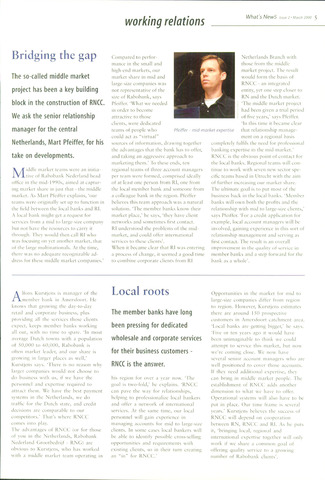working relations
Bridging the gap
Local roots
The so-called middle market
project has been a key building
block in the construction of RNCC.
We ask the senior relationship
manager for the central
Netherlands, Mart Pfeiffer, for his
take on developments.
The member banks have long
been pressing for dedicated
wholesale and corporate services
for their business customers -
RNCC is the answer.
Whdt S NewS Issue 2 March 2000
Middle market teams were an initia-
tive of Rabobank Nederland head
office in the mid-1990s, aimed at captur-
ing market share in just that - the middle
market. As Mart Pfeiffer explains, 'our
teams were originally set up to function in
the field between the local banks and RI.
A local bank might get a request for
services front a mid to large-size company
but not have the resources to carry it
through. They would then call RI who
was focusing on yet another market, that
of the large multinationals. At the time,
there was no adequate recognizable ad-
dress for these middle market companies.'
Pfeiffer - mid-market expertise
Compared to perfor
mance in the small and
high-end markets, our
market share in mid and
large-size companies was
not representative of the
size of Rabobank, says
Pfeiffer. 'What we needed
in order to become
attractive to those
clients, were dedicated
teams of people who
could act as "virtual"
sources of information, drawing together
the advantages that the bank has to offer,
and taking an aggressive approach to
marketing thern.' To these ends, ten
regional teams of three account managers
per team were formed, comprised ideally
of at least one person from RI, one from
the local member bank and someone from
a colleague bank in the region. Pfeiffer
believes this team approach was a natural
solution. 'The member banks know their
market place,' he says, 'they have cliënt
networks and sometimes first contact.
RI understood the problems of the mid-
market, and could offer international
services to these clients'.
When it became clear that RI was entering
a process of change, it seemed a good time
to combine corporate clients from RI
Netherlands Branch with
those from the middle
market project. The result
would form the basis of
RNCC - an integrated
entity, yet one step closer to
RN and the Dutch market.
'The middle market project
had been given a trial period
of five years,' says Pfeiffer.
'In this time it became clear
that relationship manage
ment on a regional basis
completely fulfils the need for professional
banking expertise in the mid-market.'
RNCC is the obvious point of contact for
the local banks. Regional teams will con
tinue to work with seven new sector spe-
cific teams based in Utrecht with the aim
of further increasing our market share.
The ultimate goal is to put most of the
business back in the local banks. 'Member
banks will own both the profits and the
relationship with mid to large-size clients,'
says Pfeiffer. 'For a credit application for
example, local account managers will be
involved, gaining experience in this sort of
relationship management and serving as
first contact. The result is an overall
improvement in the quality of service in
member banks and a step forward for the
bank as a whole'.
Alfons Kurstjens is manager of the
member bank in Amersfoort. He
knows that growing the day-to-day
retail and corporate business, plus
providing all the services those clients
expect, keeps member banks working
all out, with no time to spare. 'In most
average Dutch towns with a population
of 50,000 to 60,000, Rabobank is
often market leader, and our share is
growing in larger places as well,'
Kurstjens says. 'There is no reason why
larger companies would not choose to
do business with us, if we have the
personnel and expertise required to
attract them. We have the best payment
systems in the Netherlands, we do
traffic for the Dutch state, and credit
decisions are comparable to our
competitors.' That's where RNCC
comes into play.
The advantages of RNCC (or for those
of you in the Netherlands, Rabobank
Nederland Grootbedrijf - RNG) are
obvious to Kurstjens, who has worked
with a middle market team operating in
his region for over a year now. 'The
goal is two-fold,' he explains. 'RNCC
can pave the way for relationships,
helping to professionalize local bankers
and offer a network of international
services. At the same time, our local
personnel will gain experience in
managing accounts for mid to large-size
clients. In some cases local bankers will
be able to identify possible cross-selling
opportunities and requirements with
existing clients, so in their turn creating
an "in" for RNCC.'
Opportunities in the market for mid to
large-size companies differ from region
to region. However, Kurstjens estimates
there are around 150 prospective
customers in Amersfoort catchment area.
'Local banks are getting bigger,' he says.
'Five or ten years ago it would have
been unimaginable to think we could
attempt to service this market, but now
we're coming close. We now have
several senior account managers who are
well positioned to cover those accounts.
If they need additional expertise, they
can bring in middle market people. The
establishment of RNCC adds another
dimension to what we have to offer.
Operational systems will also have to be
put in place. Our time frame is several
years.' Kurstjens believes the success of
RNCC will depend on cooperation
between RN, RNCC and RI. As he puts
it, 'bringing local, regional and
international expertise together will only
work if we share a common goal of
offering quality service to a growing
number of Rabobank clients'.

